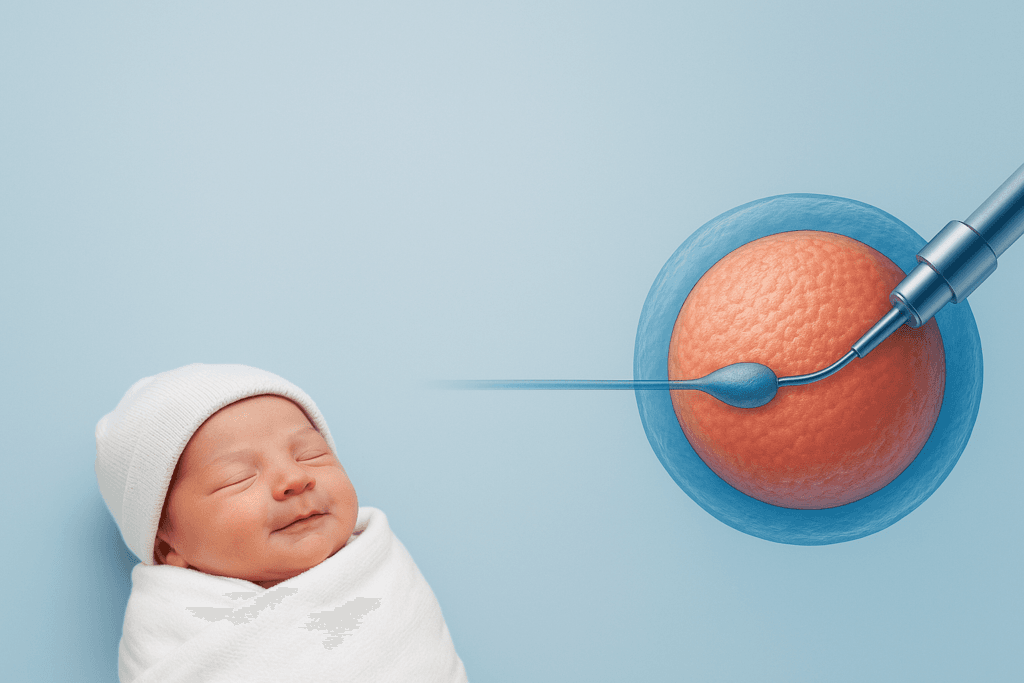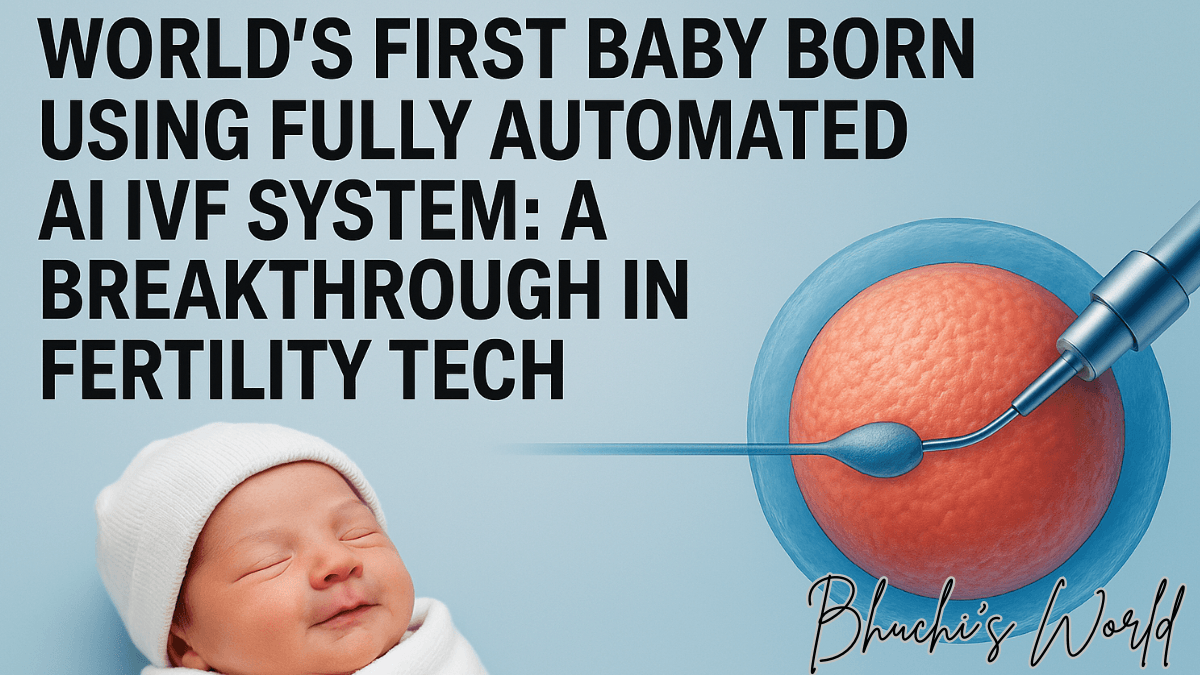In a groundbreaking development that has the potential to reshape the future of fertility treatments, the world has witnessed the birth of the first AI IVF baby conceived through a fully automated, AI-powered IVF system. This scientific milestone marks the fusion of artificial intelligence and human reproduction, a union that could redefine the way we approach infertility solutions. Developed by Conceivable Life Sciences, this automated system represents a new frontier in reproductive medicine, offering hope to millions of couples around the globe.
The successful birth took place in Guadalajara, Mexico, at Hope IVF, where a 40-year-old woman gave birth to a healthy baby boy after undergoing treatment using donor eggs. What sets this case apart from conventional IVF procedures is the complete automation of the intracytoplasmic sperm injection (ICSI) process, which traditionally requires highly skilled embryologists. With AI handling every step, the process eliminates human error and ensures consistent, high-quality results.

What Is AI-Powered IVF?
AI-powered IVF is a revolutionary technology that uses machine learning, computer vision, and robotics to perform complex tasks involved in the IVF process. At the core of this system is the automation of ICSI, where a single sperm is injected into an egg. Traditionally, this task is carried out manually under a microscope by embryologists with years of training. The new AI system automates all 23 steps of this process with remarkable precision.
How the AI ICSI System Works
- Sperm Selection: The AI scans live sperm under a microscope and uses computer vision algorithms to identify the healthiest and most motile sperm based on morphological parameters.
- Sperm Immobilization: A laser is used to immobilize the selected sperm, preparing it for injection.
- Robotic Microinjection: A robotic arm, guided by AI, injects the sperm into the egg with sub-micron precision.
This level of automation not only removes the need for human intervention but also standardizes the procedure across clinics, leading to improved outcomes.
Read more on Bhuchi’s World
The First AI IVF Baby: A Milestone Achievement
The historic birth took place at Hope IVF in Mexico. The mother, aged 40, had previously undergone a failed IVF cycle. With the help of donor eggs and the AI-powered ICSI system, five eggs were fertilized. Out of these, four embryos developed successfully. One of the high-grade embryos was selected, frozen, and later implanted. The result: the birth of a healthy baby boy, the first child born through a fully automated IVF process.
Dr. Antonio Perales, the fertility specialist who supervised the procedure, called it a “historic breakthrough” that could revolutionize the field of assisted reproduction. The success of this case paves the way for broader implementation of AI in fertility clinics worldwide.
Advantages of AI in Fertility Treatment
1. Consistency and Precision: Human embryologists, no matter how skilled, can introduce variability in the IVF process. AI systems eliminate this variability, offering consistent outcomes.
2. Reduced Human Error:The manual ICSI process is delicate and prone to error. AI eliminates common mistakes, improving success rates.
3. Accessibility: In regions lacking highly trained embryologists, AI-powered IVF can make quality fertility treatments available.
4. Scalability: Automation allows clinics to treat more patients efficiently, reducing wait times and increasing throughput.
5. Cost Reduction Over Time:While the initial setup may be expensive, automated systems can reduce long-term operational costs.
6. Objective Decision-Making:AI can assess embryos and sperm more objectively than humans, minimizing biases.
Ethical Considerations and Limitations
Despite its promising potential, AI-powered IVF is not without ethical and medical concerns:
- Data Bias: AI systems are only as good as the data they are trained on. If the training data is not diverse, it may introduce biases.
- Loss of Human Oversight: Critics argue that complete automation might overlook subtle cues that experienced embryologists can detect.
- Accessibility and Equity: Advanced technologies are often limited to high-end clinics, potentially widening the gap in access to fertility care.
- Regulatory Challenges: There are currently no universal standards or regulatory frameworks governing AI in reproductive medicine.
Future Applications of AI in Reproductive Medicine
The integration of AI in fertility treatment doesn’t stop at ICSI. Here are some areas where AI is poised to make significant contributions:
- Embryo Selection: AI can analyze time-lapse videos of embryo development to predict which embryos have the highest implantation potential.
- Semen Analysis: AI tools can assess sperm quality faster and more accurately than traditional methods.
- Ovarian Reserve Prediction: Machine learning algorithms can predict a woman’s ovarian reserve and her likelihood of IVF success.
- Personalized Hormone Protocols: AI can optimize hormone dosages for ovarian stimulation based on a patient’s medical profile.
- Remote IVF Labs: With robotic systems and AI, remote or underdeveloped regions could host IVF labs with minimal human staff.
How AI IVF Could Impact Global Fertility Trends
According to the World Health Organization, infertility affects 1 in 6 people globally. The increasing adoption of AI could change these statistics by:
- Making IVF more accessible in rural and underserved areas
- Reducing the stigma and emotional toll associated with infertility
- Improving success rates, especially in women over 35
- Lowering costs and increasing affordability for middle-income families
Countries struggling with declining birth rates, such as Japan, Italy, and South Korea, may find AI-assisted IVF to be a viable part of national fertility strategies.
AI vs Human Expertise: Will Robots Replace Embryologists?
While AI can enhance and even outperform humans in repetitive and precision-based tasks, it is unlikely to replace human embryologists entirely. Instead, the future is one of collaboration:
- AI handles the technical tasks with precision and speed.
- Embryologists oversee the process, interpret edge cases, and provide emotional support to patients.
This hybrid model ensures that technology enhances human expertise rather than replacing it.
A New Era in Fertility Medicine
The birth of the world’s first baby through a fully automated AI IVF system is not just a scientific achievement—it’s a beacon of hope for millions. By blending advanced robotics, AI, and reproductive science, this breakthrough has laid the foundation for a future where fertility treatments are safer, more accessible, and more successful.
While there are still hurdles to overcome—ethical, regulatory, and practical—the potential benefits far outweigh the risks. As technology continues to evolve, the dream of parenthood may become a reality for more people than ever before.
We are witnessing the dawn of a new era—where science and compassion meet, and where the miracle of life is aided by the brilliance of artificial intelligence.
Discover more from Bhuchi's World
Subscribe to get the latest posts sent to your email.

